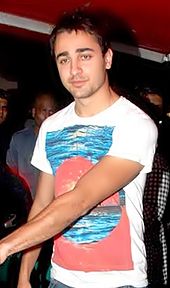Imran Khan (film actor)
[4][5] Imran's father is a Bengali Hindu who studied with Mansoor Khan at IIT Bombay and now works as a senior manager at Yahoo in California.[16][17] While training at the acting institute, Khan began networking and met writer-director Abbas Tyrewala, who offered him the lead role in Jaane Tu..."[21] Rajeev Masand of CNN-IBN called him "the best young actor" of the time, describing his performance as "unconventional and vulnerable" and stating that it created "a lasting impression.Ya Jaane Na, Khan starred in Sanjay Gadhvi's thriller Kidnap, produced by Ashtavinayak head honcho Dhilin Mehta.He was cast as Kabir Devendra Sharma, a kidnapper who abducts a girl to settle an old score with her father, played by Minissha Lamba and Sanjay Dutt, respectively.The actor was initially hesitant to play the part (calling it "tricky and tough") because he couldn't relate to the character; according to him, he would not have been able to do it without Gadhvi's support and backing.Gaurav Malani, in a review for The Economic Times, wrote: "Imran Khan is effective as the intelligent abductor who's always two steps ahead of his opponent.[27] Khan next featured alongside an ensemble cast including Dutt, Shruti Haasan, Mithun Chakraborty and Danny Denzongpa in Soham Shah's 2009 action thriller Luck, again produced by Mehta, playing Ram Mehra—an average middle-class man in dire need of money and ready to do anything for it.[29] Loosely inspired by the 2001 Italian film Intacto and the 2005 Georgian movie 13 Tzameti, it was a commercial failure[30] and generated negative reviews from critics, as did Khan's performance.[31] After the failure of Kidnap and Luck, Khan received fewer film offers, until Karan Johar approached him for the lead role in I Hate Luv Storys (2010).[32] Written and directed by debutante Punit Malhotra, the romantic comedy saw him portray Jay "J" Dhingra, a young Casanova who does not believe in the concept of love and romance.[54] In 2013, Khan appeared in three films, the first being Vishal Bhardwaj's Matru Ki Bijlee Ka Mandola, a political satire set in the rustic surroundings of a village in Haryana.[61] Khan's next film role was alongside Akshay Kumar and Sonakshi Sinha in Milan Luthria's period romantic-drama Once Upon A Time in Mumbai Dobaara!While Shubhra Gupta of The Indian Express found him unconvincing,[64] NDTV's Saibal Chatterjee wrote, "He provides evidence that he can handle a wider range of roles than he is usually allowed to play."[65] Also that year, he starred opposite Kareena Kapoor in Punit Malhotra's romantic comedy Gori Tere Pyaar Mein, a critical and commercial failure.[73] In 2011, Khan and his brother-in-law, Vedant Malik, opposed the Maharashtra state government's new law raising the drinking age to 25 by filing a public-interest litigation (PIL) against it."[75] He walked the ramp to support Shabana Azmi's charitable initiative, Mijwan Welfare Society, an NGO dedicated to empowering girls.[81] In 2014, it was announced that he had joined other Bollywood and international celebrities in the TeachAids initiative, a state-of-the-art approach to worldwide HIV prevention, developed at Stanford University.[86] He has endorsed several products (including Coca-Cola, Levis, MTS India, Maaza, Bru and Lux), having appeared in television and print advertisements.[116] The following year he was featured on GQ India's list of "Bollywood's 11 Best-Dressed Actors", which described his style sense: "grown and matured into an irresistible combination of goody-two-shoesness and an urbane sophistication.[118] After moving from his "lover boy" image in Delhi Belly and Matru Ki Bijlee Ka Mandola,[88] Khan was noted for experimenting with different genres and character types.




Imran Khan (disambiguation)Matru Ki Bijlee Ka MandolaMadison, WisconsinNew York Film AcademyHindi filmsAamir KhanMansoor KhanNasir HussainQayamat Se Qayamat TakJo Jeeta Wohi SikandarJaane Tu... Ya Jaane NaFilmfare Award for Best Male DebutI Hate Luv StorysMere Brother Ki DulhanEk Main Aur Ekk TuDelhi BellyHindustan Timessoftware engineerpsychologistBengaliKolkataBengali HinduIIT BombayCaliforniaMuslimMumbaiRaj ZutshiBombay Scottish SchoolstammerCoonoorTamil NaduGurukulSunnyvale, CaliforniaFremont High Schoolfilm directorLos AngelesfilmmakingRoald DahlAbbas TyrewalaKhalid MohammedRajeev MasandCNN-IBNBest Male Debut54th Filmfare AwardsFarhan AkhtarSanjay GadhviKidnapAshtavinayakDhilin MehtakidnapperMinissha LambaSanjay DuttThe Economic TimesShruti HaasanMithun ChakrabortyDanny DenzongpastuntsIntactoGeorgian13 TzametiRediff.comRaja SenKaran JoharPunit MalhotraKomal NahtaDanish Aslamcoming-of-ageBreak Ke BaadNamrata JoshiOutlookAnupama ChopraKatrina KaifAbhinay Deoblack comedycrime bossKunaal Roy KapurVir DasMid-DayNikhat KazmiThe Times of IndiaAli Abbas ZafarAli ZafarShakun BatraKareena KapoorLas VegasKaran AnshumanMumbai MirrorOnce Upon A Time in Mumbai Dobaara!Vishal Bhardwajpolitical satireHaryanaPankaj KapurAnushka SharmaShabana AzmiHaryanviReutersAkshay KumarSonakshi SinhaMilan LuthriaperiodOnce Upon a Time in MumbaaiThe Indian ExpressGori Tere Pyaar MeinNikhil AdvaniKatti BattiKangana RanautEve EnslerThe Vagina MonologuesPeople for the Ethical Treatment of AnimalsadvertisementsMaharashtra state governmentpublic-interest litigation (PIL)ban on gay sexTeachAidsStanford UniversitycolumnistalcoholtobaccoCoca-ColaMTS IndiaPali HillRaghav BahlNetwork18 GroupShahrukh KhanHrithik RoshanKarjat